

Lauren
Where Are You Going, Where Have You Been? Why is "Where Are You Going, Where Have You Been?
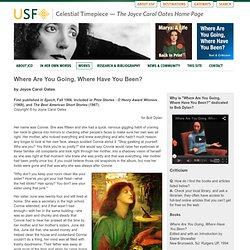
" dedicated to Bob Dylan? Criticism Q: How do I find the books and articles listed below? A: Check your local library, and ask a librarian; they often have access to full-text online articles that you can't get for free on the web. Books Where Are You Going, Where Have You Been? Johnson, GregJoyce Carol Oates: A Study of the Short FictionNew York: Twayne, 1994 Johnson, Greg"The Short Stories (I) : The Wheel of Love"Understanding Joyce Carol OatesColumbia: University of South Carolina Press, 1987, p92-116. Thefly. The Fly by Katherine Mansfield ..
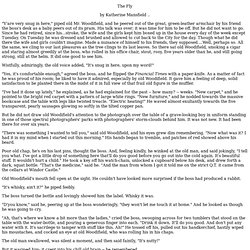
"Y'are very snug in here," piped old Mr. Woodifield, and he peered out of the great, green-leather armchair by his friend the boss's desk as a baby peers out of its pram. His talk was over; it was time for him to be off. But he did not want to go. Wistfully, admiringly, the old voice added, "It's snug in here, upon my word! " "Yes, it's comfortable enough," agreed the boss, and he flipped the Financial Times with a paper-knife. "I've had it done up lately," he explained, as he had explained for the past -- how many? But he did not draw old Woodifield's attention to the photograph over the table of a grave-looking boy in uniform standing in one of those spectral photographers' parks with photographers' storm-clouds behind him.
"There was something I wanted to tell you," said old Woodifield, and his eyes grew dim remembering. Poor old chap, he's on his last pins, thought the boss. Old Woodifield's mouth fell open at the sight. Flannery O'Connor:"A Good Man is Hard to Find" From:Flannery O'Connor: Collected Works the Library of America Flannery O'Connor 1925-1964 (c)1953, 1954 p137 THE GRANDMOTHER didn't want to go to Florida.
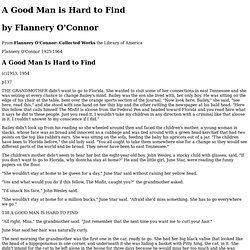
She wanted to visit some of her connections in east Tennessee and she was seizing at every chance to change Bailey's mind. Bailey didn't look up from his reading so she wheeled around then and faced the children's mother, a young woman in slacks, whose face was as broad and innocent as a cabbage and was tied around with a green head-kerchief that had two points on the top like rabbit's ears. The children's mother didn't seem to hear her but the eight-year-old boy, John Wesley, a stocky child with glasses, said, "If you don't want to go to Florida, why dontcha stay at home? " "She wouldn't stay at home to be queen for a day," June Star said without raising her yellow head. "Yes and what would you do if this fellow, The Misfit, caught you? " "I'd smack his face," John Wesley said.
"All right, Miss," the grandmother said. Fiction: Symbols and Signs. For the fourth time in as many years, they were confronted with the problem of what birthday present to take to a young man who was incurably deranged in his mind.
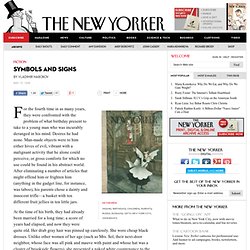
Desires he had none. Man-made objects were to him either hives of evil, vibrant with a malignant activity that he alone could perceive, or gross comforts for which no use could be found in his abstract world. After eliminating a number of articles that might offend him or frighten him (anything in the gadget line, for instance, was taboo), his parents chose a dainty and innocent trifle—a basket with ten different fruit jellies in ten little jars. At the time of his birth, they had already been married for a long time; a score of years had elapsed, and now they were quite old.
The Lottery. By Shirley Jackson Shirley Jackson's short story The Lottery was published in 1948 and is not in the public domain.
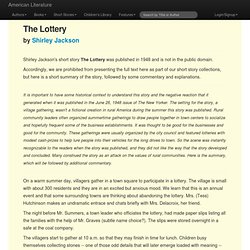
Accordingly, we are prohibited from presenting the full text here as part of our short story collections, but here is a short summary of the story, followed by some commentary and explanations. It is important to have some historical context to understand this story and the negative reaction that it generated when it was published in the June 26, 1948 issue of The New Yorker. The setting for the story, a village gathering, wasn't a fictional creation in rural America during the summer this story was published. Rural community leaders often organized summertime gatherings to draw people together in town centers to socialize and hopefully frequent some of the business establishments.
On a warm summer day, villagers gather in a town square to participate in a lottery. The night before Mr. The villagers start to gather at 10 a.m. so that they may finish in time for lunch. Mr.